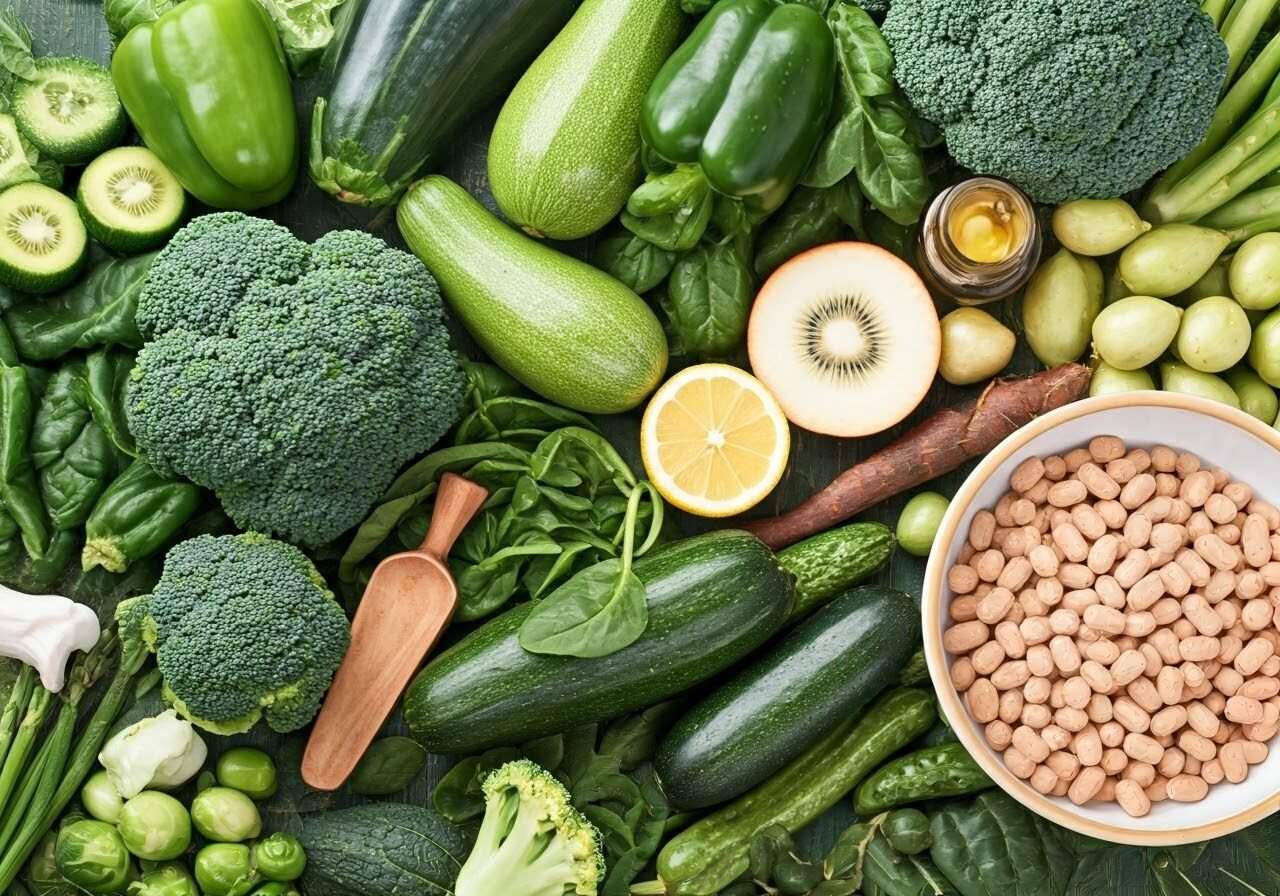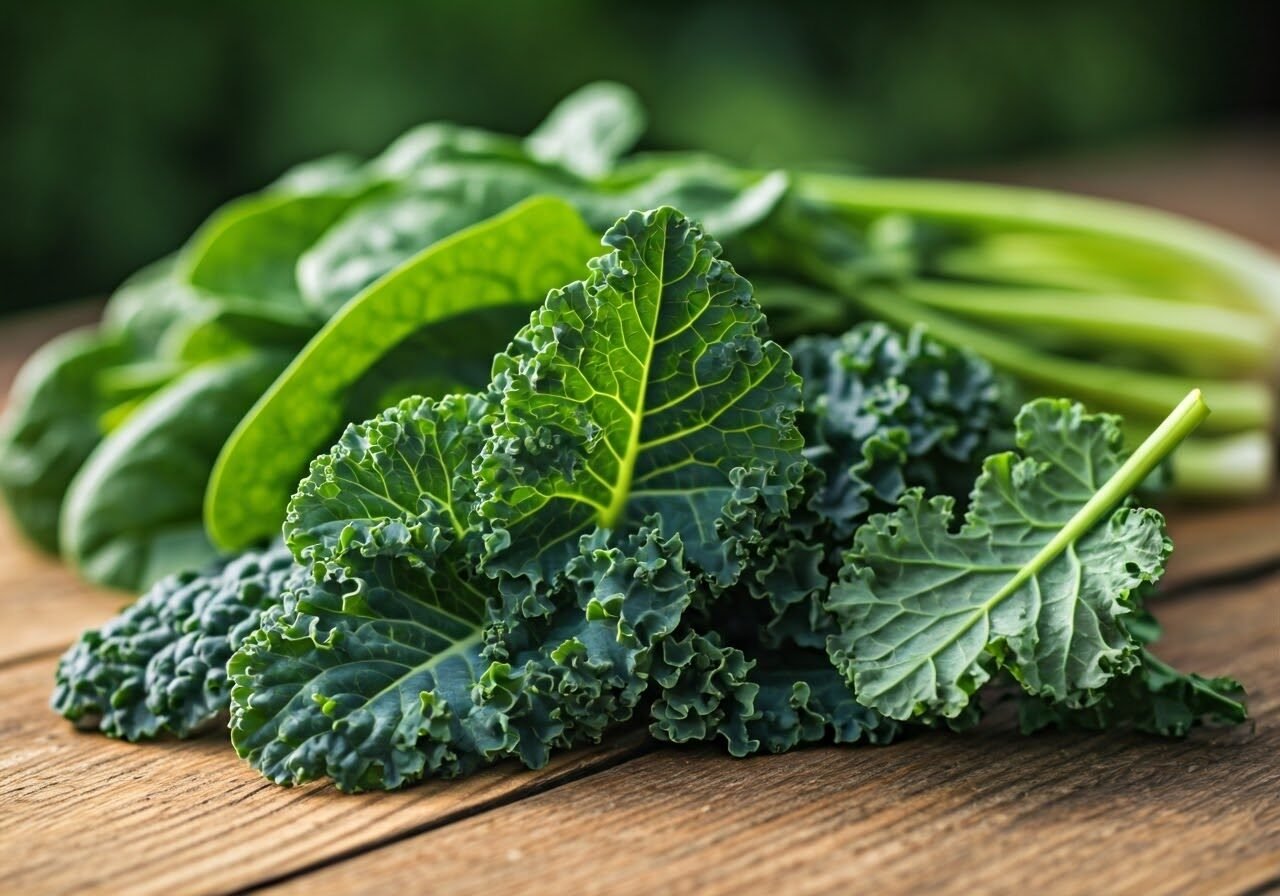
The Essential Vitamin K: An Overview
Vitamin K is different from many other vitamins. You do not usually get it from supplements. It is found naturally in various foods. The human body can even make a small amount of it by itself.
This special vitamin comes in different forms. It is important for many body functions. The main job of Vitamin K is helping with blood clotting. New research shows that it may also help with bone density, heart health, and brain function.
What Is Vitamin K and How It Functions in the Body
Vitamin K is not just one vitamin. It is a group of fat-soluble vitamins that share similar chemical structures. The two main types, or forms of vitamin K for humans are vitamin K1 (phylloquinone) and vitamin K2 (menaquinones).
Vitamin K1, the main form of vitamin K, is found mostly in green leafy vegetables. It is the main predominant form of vitamin K that we eat. Vitamin K2, however, comes in different forms of vitamin K. You can find it in fermented foods and some animal products. Our gut bacteria can also make some vitamin K2.
Both types of vitamin K are important for us. But they are absorbed and used differently in our bodies. This affects their health benefits. While studies are still being done, we can see that both forms play a role in blood clotting, bone health, and heart health.
Available Forms of Vitamin K1 and K2 (Phylloquinone vs Menaquinone)
Vitamin K supplements are not usually recommended unless you have a deficiency. Luckily, you can get enough Vitamin K from your diet much more easily than you might think!
Vitamin K1 is found in great amounts in leafy greens such as spinach, kale, and collard greens. Adding these foods to your meals can help you meet your daily needs.
For Vitamin K2, try including fermented foods like natto (fermented soybeans), sauerkraut, and some cheeses in your diet. Eating meats, eggs, and dairy in moderation can also help with your intake of Vitamin K2.
Table: Vitamin K1 vs K2
| Feature | Vitamin K1 (Phylloquinone) | Vitamin K2 (Menaquinones) |
|---|---|---|
| Main Sources | Leafy green vegetables | Fermented foods, certain animal products |
| Examples | Kale, spinach, broccoli | Natto, aged cheese, egg yolks, liver |
| Function in the Body | Primarily supports blood clotting | Supports bone mineralization, cardiovascular health, and calcium metabolism |
| Bioavailability | Lower (especially from raw greens) | Higher (especially MK-7 from natto and fermented sources) |
| Half-Life in Body | Short (typically under 2 hours) | Long (up to 72 hours or more for MK-7) |
| Absorption Site | Mainly absorbed in the small intestine (proximal) | Absorbed in the small and distal intestine |
| Conversion | Cannot convert to K2 | Some forms can be synthesized by gut bacteria |
| Health Benefits | Prevents excessive bleeding, supports normal blood clotting | Reduces arterial calcification, supports stronger bones, improves heart function |
| Who May Benefit More | General population with a balanced diet | Individuals at risk for osteoporosis or cardiovascular disease, especially those with low K2 intake |
Top Health Benefits of Vitamin K for Bones, Heart, Skin & More

Vitamin K is often ignored, but it is very important for many body functions. It helps with blood clotting, which we already know, and new studies show it may help with bone and heart health too. Vitamin K is starting to get the credit it deserves.
This part looks at the surprising benefits of vitamin K and shows why it is important for our overall health.
How Vitamin K Supports Bone Health and Prevents Osteoporosis
Maintaining strong and healthy bones needs many nutrients, and Vitamin K is very important. This vitamin helps activate proteins that play a direct role in building bones and managing calcium.
Studies show that Vitamin K helps improve bone mineral density, particularly when considering the levels of vitamin K in the body. This is important for preventing osteoporosis, a condition where bones become weak and break easily. This is especially important as we grow older and lose bone mass more quickly.
While more studies are needed for clear guidelines, getting enough Vitamin K in your diet or taking supplements in certain cases could help support your bone health.
Vitamin K and Heart Health: Calcium Regulation and Arterial Protection
Emerging research shows that vitamin K may help keep your heart healthy. It seems to affect how calcium is stored in your body. When calcium builds up in our arteries, it leads to vascular calcification. This can slow down blood flow and raise the chance of heart disease.
Some studies suggest that having enough vitamin K levels might help stop this harmful build-up and lower the risk of heart disease, according to recent findings published in J Nutr. This is a promising area, but more clinical trials are needed to be sure about these results.
If you take blood thinners, it is very important to talk to your doctor before you change your vitamin K intake. It can affect how some medications work.
Vitamin K for Blood Clotting: How It Works in the Body
Blood clotting is a complicated process that our bodies start to stop too much bleeding when we get hurt. Vitamin K is very important in this process. It helps activate proteins with amino termini that are needed to form clots.
If we do not have enough vitamin K, our bodies cannot make these important clotting factors. This can cause serious bleeding. This is especially important for people who have a vitamin K deficiency or who take blood thinners that affect vitamin K.
Watching prothrombin time is useful. This is a test that shows how long it takes for blood to clot. Doctors use this test to check and adjust vitamin K intake. This way, they can help achieve a good balance between stopping excessive bleeding and keeping normal clotting times.
Can Vitamin K Improve Cognitive Function and Brain Health?
Vitamin K is known for helping with blood clotting and bone health. Now, new research is looking at how it may also benefit our brains. This research is just starting, but it shows a hopeful connection between Vitamin K and cognitive health.
Some studies have found that getting enough Vitamin K may lead to better thinking skills, like memory and processing speed. The reasons for these possible benefits are still being studied. Some scientists think Vitamin K could help protect brain cells from getting hurt.
More studies are needed to confirm these results and find out the best Vitamin K intake for brain health. However, these early findings suggest there could be a great way to support brain health through nutrition.
Vitamin K for Skin Health: Elasticity, Wrinkle Reduction & Scar Support
Vitamin K is often talked about for its benefits inside the body. However, it is also good for skin health. New studies show that vitamin K may help skin by making it more elastic and better looking, especially for scars.
This vitamin seems to help produce collagen. Collagen is a key protein that gives our skin strength and structure. With more collagen, vitamin K may help our skin feel smoother and firmer. It might also help reduce wrinkles and fine lines.
Additionally, some studies hint that using vitamin K on the skin could reduce scar formation and speed up healing. More research is needed to confirm this, but exploring vitamin K and its effects on skin health could be a good idea.
Uses and Effectiveness of Vitamin K

Vitamin K is famous for helping blood clot. But it may also be useful in other health areas. This shows it could help in future treatments and ways to prevent health issues.
In this section, we will look at how vitamin K is used as an animal feed supplement and how well it works. It plays a key role in preventing deficiencies. It may also help in treating osteoporosis and heart disease.
Table: Overview of Vitamin K Applications and Target Groups
| Application Area | Target Group / Condition | Primary Role / Effectiveness of Vitamin K | Notes / Key Considerations |
|---|---|---|---|
| Deficiency Prevention | General population, newborns, individuals with malabsorption | Prevents deficiency symptoms; essential for normal blood clotting and protein synthesis | Newborns typically receive vitamin K injection after birth; adults with GI issues at risk |
| Newborn Health | Infants | Prevents Vitamin K Deficiency Bleeding (VKDB) | A single prophylactic injection is the standard and highly effective intervention |
| Osteoporosis | Adults with low bone density or postmenopausal women | May improve bone mineral density and reduce fracture risk | K2 (especially MK-7) studied as adjunct therapy; not a substitute for calcium/vitamin D |
| Coronary Heart Disease | Individuals with cardiovascular risk factors | May reduce arterial calcification and support vascular flexibility | Emerging research; most promising for K2 (MK-7); more clinical trials are underway |
| Cancer Support & Research | General population (prevention); cancer patients (adjunct) | May reduce risk of certain cancers and improve treatment outcomes in lab models | Investigational; not a standalone treatment; use only under medical supervision |
Preventing Vitamin K Deficiency
Vitamin K deficiency is uncommon in healthy adults because our bodies make small amounts of it, and we can find it in various foods. Still, some situations can raise the risk of deficiency. In these cases, we need to actively ensure we are getting enough vitamin K.
Newborns are more at risk due to low vitamin K levels passed during pregnancy and small amounts in breast milk. To stop vitamin K deficiency bleeding (VKDB), a vitamin K injection is usually given shortly after they are born.
Also, people who have malabsorption disorders, those taking long-term antibiotics, or those who follow very strict diets may want to talk to a healthcare provider. They can check your vitamin K status and suggest dietary changes or, if needed, recommend supplements to help meet your needs.
The Importance of Vitamin K in Newborn Health
Newborn infantsbabies are born with very little vitamin K. This makes them at risk for a serious problem called vitamin K deficiency bleeding (VKDB). VKDB can cause uncontrolled bleeding and even dangerous health issues in severe cases.
To stop VKDB from happening, healthcare providers give a single injection of vitamin K to babies right after they are born. This injection is very effective and has greatly reduced the number of VKDB cases, as endorsed by the principles of drug administration.
There are also oral vitamin K drops available, but the injection is usually better. It works faster and is more reliable at increasing vitamin K levels in newborns.
Treating Conditions: A Look into Osteoporosis and Coronary Heart Disease
Research is still ongoing, but studies show that getting enough vitamin K might help bone and heart health. It is not a single treatment on its own, but it can work alongside traditional methods.
People are interested in vitamin K because of its role in bone health, particularly in preventing low bone density. Some studies suggest that higher vitamin K intake could help improve bone density and lower the risk of fractures.
Early research also points to a connection between having enough vitamin K and a lower chance of heart disease. Experts think vitamin K may help stop arteries from hardening, which is important in preventing heart disease.
Vitamin K in Cancer Prevention and Treatment
Research on vitamin K’s role in preventing and treating cancer is just starting. Some studies show that having enough vitamin K may lower the risk of specific types of cancer. However, we need more studies to confirm this.
Clinical trials have shown mixed results. Some suggest that taking vitamin K might slow down cancer cells ormake certain cancer treatments better. Still, these results are not final, and we need more research.
Because cancer is complex, we should be careful about believing claims that vitamin K can fight cancer. It’s important to talk to healthcare providers for personalized advice on preventing and treating cancer.
Safety, Precautions, and Interactions

While Vitamin K is usually seen as safe, it is important to know about the risks, interactions, and suggested doses. This is especially true for people with certain health issues or who take specific medications.
This part looks at the safety of Vitamin K for different age groups. It also talks about the risks of high doses, how it interacts with common medications, and what people with malabsorption disorders should consider.
Table: Vitamin K Deficiency vs Toxicity Symptoms
| Feature | Vitamin K Deficiency | Vitamin K Toxicity |
|---|---|---|
| Main Cause | Inadequate dietary intake, fat malabsorption, prolonged antibiotic use, liver disease | Excessive supplementation (especially synthetic K3); rare with natural forms (K1, K2) |
| Risk Groups | Newborns, people with gastrointestinal disorders, long-term antibiotic users | Individuals taking unregulated or high-dose vitamin K3 (banned in the U.S.) |
| Common Symptoms | Easy bruising, prolonged bleeding, blood in urine or stool | Rare — nausea, flushing, jaundice, hemolytic anemia (especially in infants) |
| Severe Consequences | Vitamin K Deficiency Bleeding (VKDB), intracranial hemorrhage in infants | Liver toxicity (seen in animal studies), hemolysis in newborns (high K3 intake) |
| Onset Speed | Gradual onset (except acute cases in newborns) | Very rare; usually due to megadoses of synthetic forms |
| Clinical Monitoring | PT/INR (Prothrombin Time) testing for coagulation status | Not typically monitored; toxicity rare with dietary or supplemental K1/K2 |
How Much Vitamin K Do You Need Daily? (By Age & Gender)
The recommended daily allowance (RDA) or adequate intake (AI) of vitamin K varies based on age and gender, as outlined by the National Institutes of Health. Meeting these recommendations is crucial for supporting various bodily functions, including blood clotting and bone health.
Here’s a table summarizing the daily vitamin K recommendations:
Age Group | AI (mcg/day) |
|---|---|
Infants 0-6 months | 2 mcg |
Infants 7-12 months | 2.5 mcg |
Children 1-3 years | 30 mcg |
Children 4-8 years | 55 mcg |
Children 9-13 years | 60 mcg |
Girls 14-18 years | 75 mcg |
Women 19+ years | 90 mcg |
Pregnant/Breastfeeding Women | 90 mcg |
Boys 14-18 years | 75 mcg |
Men 19+ years | 120 mcg |
It’s always advisable to consult a healthcare professional or registered dietitian for personalized guidance regarding vitamin K intake and to address any concerns.
Is Too Much Vitamin K Harmful? Risks, Overdose & Safety Tips
Vitamin K is an essential nutrient that plays a crucial role in blood clotting and bone health. While getting vitamin K from food sources is generally safe and beneficial, caution should be exercised when considering high doses of vitamin K supplements. Individuals with specific health conditions, especially those on blood-thinning medications or with blood clotting disorders, need to be particularly careful about supplementing with vitamin K.
Consuming foods naturally rich in vitamin K, such as leafy greens, broccoli, and Brussels sprouts, is unlikely to lead to excessive intake beyond the recommended dietary allowance. However, exceeding the recommended dosage of vitamin K through supplements can potentially interfere with blood-thinning medications and pose risks for individuals with certain medical conditions.
Before initiating any new supplement regimen it is imperative to consult with a healthcare professional. They can provide personalized advice based on your medical history, current medications, and individual health needs to ensure your safety and prevent any adverse effects. By seeking guidance from a healthcare provider, you can make informed decisions regarding your supplement intake and maintain optimal health.
Vitamin K Drug Interactions: Blood Thinners, Antibiotics, and More
Vitamin K is important for health, but it can interact with some medications. This may change how well these drugs work or increase side effects. It’s important to know these interactions to stay safe and healthy.
People who take blood thinners, like warfarin (Coumadin), should keep their vitamin K intake steady. These medications stop certain clotting factors that need vitamin K, so changes in vitamin K levels can affect how well they work.
Antibiotics, especially broad-spectrum ones, may change the gut bacteria that make vitamin K. This usually does not cause a deficiency in healthy people. However, those with health issues or dietary restrictions should talk to their doctor to check their vitamin K status.
Table: Vitamin K Interactions with Medications
| Medication | Interaction Effect | Risk Level | Recommendation |
|---|---|---|---|
| Warfarin (Coumadin) | Reduces anticoagulant effectiveness by interfering with clotting factors | High | Keep vitamin K intake consistent daily to avoid INR fluctuations |
| Broad-Spectrum Antibiotics | Disrupts gut microbiota that synthesize vitamin K2 | Moderate | Monitor vitamin K status if antibiotics are used long-term |
| Bile Acid Sequestrants | Decrease absorption of fat-soluble vitamins including vitamin K | Moderate | Take vitamin K supplements several hours apart from these medications |
| Orlistat (Alli, Xenical) | Reduces fat absorption and lowers vitamin K uptake | Moderate | Consider multivitamin with vitamin K; monitor levels during use |
| Chronic Corticosteroids | May interfere with vitamin K metabolism and bone health indirectly | Low–Moderate | Use under medical supervision; monitor clotting and bone density |
Vitamin K and Malabsorption Disorders: What You Need to Know
Individuals with malabsorption disorders, like celiac disease, Crohn’s disease, or cystic fibrosis, need to pay close attention to how much vitamin K they get. These disorders can affect how nutrients, such as vitamin K, are absorbed in the digestive system.
Having trouble absorbing nutrients can raise the risk of having low vitamin K. This can cause problems with blood clotting and lead to other health issues. So, it’s important for these individuals to keep track of their vitamin K status.
Healthcare providers can see what each person needs and suggest changes to their diet, vitamin K supplements, or other ways to help them keep good vitamin K levels and avoid problems.
Best Sources of Vitamin K in Food and Supplements

Meeting your daily needs for vitamin K is easy when you have a balanced diet. This important vitamin is found in many foods. Sometimes, you might need supplements, but it is best to talk about it with a healthcare professional.
This section will look at different foods that have vitamin K. in the United States. These foods include leafy green vegetables, fermented foods, and meats. We will highlight how you can find this essential nutrient in your daily meals.
Natural Sources: Green Leafy Vegetables, Fruits, and Dairy
Adding vitamin K to your diet is easier than you think because many foods have it. Green leafy vegetables are great sources of vitamin K1.
Some powerful ones to include are:
Spinach: Spinach is full of vitamins and minerals. It has a lot of vitamin K and antioxidants.
Kale: Kale is well known for its health benefits. It’s a great choice to increase your vitamin K intake.
Collard Greens: Collard greens are tasty and a good way to boost your vitamin K levels.
You can also get vitamin K from other green vegetables like broccoli and Brussels sprouts. Eating these foods can help you meet your daily vitamin K needs.
Here is a list of the best foods for Vitamin K1 and K2. It shows how much Vitamin K is in each food per 100 grams, along with some useful notes.
Table: Top Food Sources of Vitamin K1 and K2
| Food Item | Type | Vitamin K Form | Approx. Content (per 100g) | Notes |
|---|---|---|---|---|
| Kale (raw) | Leafy green | K1 (Phylloquinone) | ~817 mcg | One of the richest plant-based sources |
| Spinach (boiled) | Leafy green | K1 | ~480 mcg | Cooking improves absorption |
| Broccoli (steamed) | Vegetable | K1 | ~141 mcg | Easy to incorporate in meals |
| Brussels sprouts | Vegetable | K1 | ~177 mcg | Also provides fiber and antioxidants |
| Natto (fermented soybeans) | Fermented food | K2 (MK-7) | ~1100 mcg | Highest known natural source of K2 |
| Hard cheeses (e.g. Gouda) | Dairy | K2 (MK-8, MK-9) | ~76 mcg | Longer fermentation increases K2 |
| Egg yolk | Animal product | K2 (mainly MK-4) | ~32 mcg | Varies based on hen’s diet |
| Chicken liver | Organ meat | K2 (MK-4) | ~14 mcg | Nutrient-dense, rich in other vitamins |
| Sauerkraut | Fermented vegetable | K2 (MK-7) | ~1–5 mcg | Small amount; supports gut health |
| Butter | Dairy | K2 (MK-4, low) | ~15 mcg | Minimal K2, but part of MK-4 intake |
To raise your vitamin K levels, eat more leafy green vegetables for K1. For K2, include fermented foods or animal products in your diet. Also, remember to pair K1-rich foods with healthy fats. This helps your body take in the nutrients better.
The Role of Fermented Foods and Meats
Green leafy vegetables are famous for having vitamin K1. But don’t forget that fermented foods and some meats are also very important for getting vitamin K2.
These foods help create a healthy gut, which boosts how your body makes vitamin K:
Natto: This is a traditional breakfast food from Japan, made from fermented soybeans. Natto is very rich in vitamin K2, especially the MK-7 type.
Sauerkraut: This is a dish made from fermented cabbage. It has a lot of good bacteria and helps increase your vitamin K2.
Cheese: Some hard cheeses, like cheddar and Swiss, provide a decent amount of vitamin K2.
Adding these foods to your meals can help improve your gut health as well as increase your vitamin K levels.
Navigating Vitamin K Supplements
Getting enough vitamin K from a balanced diet is the best way. But, if you can’t get enough vitamin D from food, supplements can help.
You can find vitamin K supplements in many forms, like tablets, capsules, and liquid drops. This gives you choices based on your likes and needs. Before you start taking a vitamin K supplement, talk to your doctor. They can check if it will mix well with your other medicines and suggest the right dose for you.
Make sure to keep your supplements in a cool, dry spot, away from kids. If you have any worries or notice something strange, reach out to your doctor.
How to Increase Your Vitamin K Intake Naturally
Boosting your vitamin K intake does not mean you have to completely change your diet. Easy additions to your meals can really help.
Here are some helpful tips:
Embrace Salads: Include salads in your meals, using many kinds of leafy greens such as spinach, kale, and romaine lettuce.
Sneak Greens into Smoothies: Adding greens like turnip greens to your smoothies is a smart trick to get more vitamins without losing taste.
Try Fermented Foods: Add fermented foods like natto, sauerkraut, or kimchi to your meals.
Keep in mind, it’s important to be consistent. Making these small changes can help you steadily increase your vitamin K intake and improve your overall health and wellness.
Latest Research on Vitamin K

The study of vitamin K’s possible benefits stays interesting for researchers. New studies are showing interesting connections to different health areas. These findings could lead to new ways to treat and prevent health issues.
In this section, we will look at the latest research on vitamin K. We will focus on its role in mental health, how it might affect aging, and where future research could go, especially in relation to genetics.
The Emerging Link Between Vitamin K and Mental Health
Recent studies suggest a possible link between vitamin K and mental health. This might be related to how we think and feel. While this research is still new, it offers interesting ideas.
Early findings show that having enough vitamin K levels may improve thinking skills, like memory and decision-making. Scientists are still figuring out how this works. Some think that vitamin K could help protect brain cells from harm.
Also, some studies indicate there may be a connection between vitamin K intake and mood. This suggests that it might help us feel better emotionally. More studies are needed to confirm this. However, the new data shows hope for future research.
Cutting-Edge Studies on Vitamin K and Aging
As we grow older, staying healthy is very important. Researchers are always looking for ways to improve our lifespan and the quality of life. Recent studies on vitamin K and aging have shown some interesting findings.
Vitamin K helps with bone health. Research indicates that having enough vitamin K may help prevent bone loss as we age. There is also new research looking into how vitamin K might help us age well. This includes supporting our brain function, heart health, and skin firmness.
Even though we need more studies to truly understand everything and to give clear advice, these findings open up exciting options. We can focus on healthy aging by having the right vitamin K intake and making sure our bodies use it well.
Future Directions: Vitamin K and Genetic Research
Emerging areas of genetic research are helping us understand human health better. It looks at how our genes affect how we absorb and use nutrients. This gives us exciting ways to see how our unique genetic traits might affect how we respond to vitamin K.
Future research will focus on finding specific genes involved in vitamin K metabolism, including genes related to vitamin K-dependent carboxylase. We want to know how these genetic differences could affect how likely a person is to have a vitamin K deficiency. It could also show us how well a person might benefit from vitamin K supplementation.
Long-term studies that look at genetic data, along with what people eat and their health results, can help us develop personalized vitamin K recommendations. This will be based on each person’s unique genetic traits.
The Global Perspective on Vitamin K Research
Research on vitamin K is growing around the world. Scientists are looking into its many roles in health and illness. Global teamwork and studies across different cultures are helping us learn more. They also address how vitamin K intake can vary by location.
Clinical trials done in various populations worldwide help us create a better understanding. This helps ensure that research findings apply to people of all backgrounds and ways of life.
This worldwide view is important for shaping public health advice about vitamin K intake. It helps in creating diet plans for better health results for everyone.
Conclusion
Vitamin K has many surprising health benefits. It helps with bone strength and supports heart health. It also aids in blood clotting and can improve brain function. Additionally, Vitamin K is important for skin elasticity and healing scars. You can get this nutrient from natural foods like leafy greens and fruits or by taking supplements. It’s important to make sure you have an adequate intake of Vitamin K. Stay updated on new research about how Vitamin K is connected to mental health and aging. This could lead to helpful discoveries in the future. Use Vitamin K to boost your health and help you live longer.
The content on WellwayHub.com is intended for general informational purposes only and should not be taken as medical advice. Please consult your doctor or a qualified health professional before making any changes to your health routine.
Some links on WellwayHub.com may be affiliate links. This means we may earn a small commission if you make a purchase through these links, at no extra cost to you. This helps support our mission to provide trusted wellness content.
Frequently Asked Questions
Vitamin K is a vitamin that dissolves in fat. It is very important for your health. It helps your blood clot, keeps your bones healthy, and supports your heart. Vitamin K activates proteins that help with blood clotting. It also helps control calcium in your bones and blood vessels.
There are several common signs. You might notice easy bruising, long bleeding, or blood in your urine or stool. In serious cases, it could cause internal bleeding. For newborns, this could lead to vitamin K deficiency bleeding (VKDB).
Low vitamin K levels in the body can happen for several reasons. A poor diet is one cause. Gastrointestinal problems, such as celiac or Crohn’s disease, can also lead to low levels. Long-term use of antibiotics may play a role, as well as liver disease.
Yes. If there is not enough vitamin K, the body cannot make clotting factors well. This can result in too much or uncontrolled bleeding.
The daily requirement changes with age and sex. Adult men need around 120 mcg a day. Women need about 90 mcg a day. Infants and kids need less, but the requirement may go up during pregnancy or breastfeeding.
It is very rare to get too much vitamin K from food. It is also not common to have problems with K1 and K2. However, it is possible with synthetic forms (K3). These forms are not approved for human use in the U.S.
No. The symbol "K" on the periodic table stands for potassium, but vitamin K and potassium are different nutrients. They have different jobs in the body.
Vitamin K1 comes from leafy greens. It helps with clotting. K2 is found in fermented foods and animal products. It plays a bigger role in keeping bones and hearts healthy.
You can find K1 in spinach, kale, and broccoli. K2 is present in natto, aged cheeses, egg yolks, and chicken liver.
Yes. Studies show that vitamin K2 can help improve bone strength. It may also lower the chance of breaks, especially in women after menopause or those with osteoporosis
Vitamin K2 helps stop calcium from building up in arteries. It does this by activating a protein called GLA. This protein helps prevent hardening of the arteries.
Some studies suggest that vitamin K might help skin health. It could boost collagen production and make scars less visible. More clinical studies are needed.
New findings suggest a connection between getting enough vitamin K and improved memory, faster processing, and help in fighting age-related decline in brain health.
Yes. Vitamin K can affect how well Warfarin works. Antibiotics can also reduce the amount of vitamin K2 made in the gut. It’s best to talk to a doctor.
If you take blood thinners, do not change how much high-K foods like kale or spinach you eat all at once. Staying steady in your intake is important, but you don’t need to stop eating those foods altogether.
People who take anticoagulants like Warfarin or have certain blood clotting issues should talk to a healthcare provider before taking vitamin K supplements.